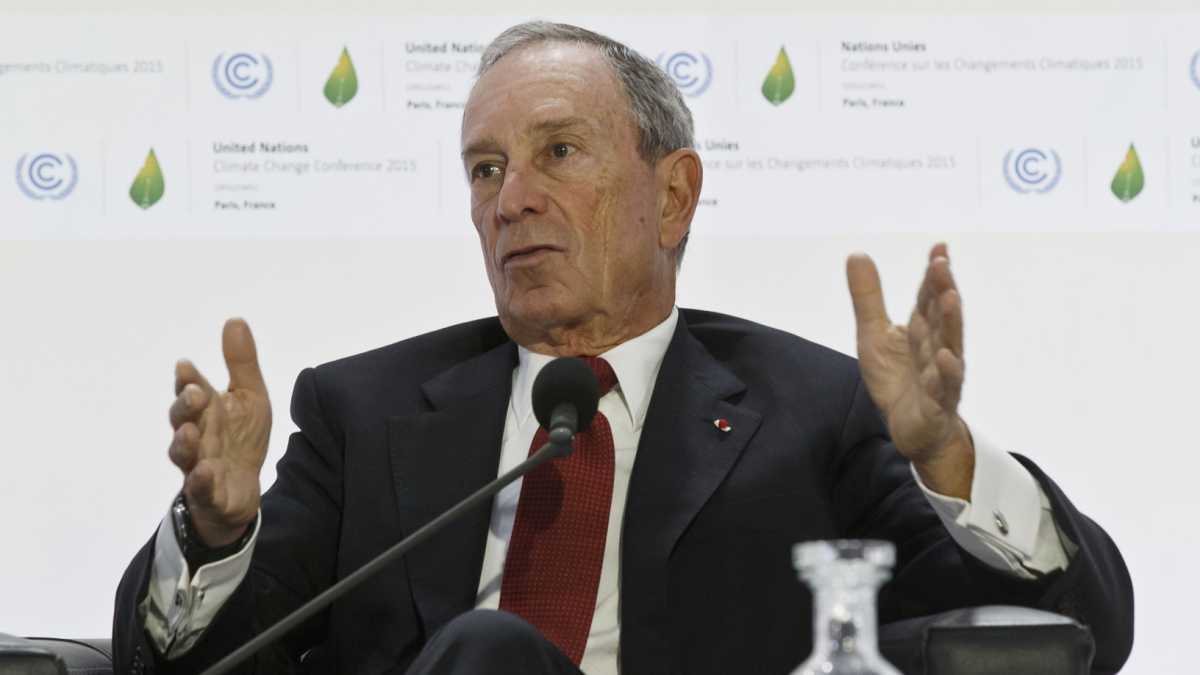Here we go again: Michael Bloomberg floats his balloon

Former New York City Mayor Michael Bloomberg gestures as he speaks during a panel discussion on 'Climate Change and Financial Markets' at the COP21, United Nations Climate Change Conference, in Le Bourget north of Paris, Friday, Dec. 4, 2015. (Michel Euler/AP Photo)
Nature’s rituals never change. Birds fly south for the winter, flowers bloom in the spring, and Michael Bloomberg floats a balloon on the eve of voting season.
Right on schedule, he’s done it again. The news this weekend (or, perhaps more accurately, the “news”) is that the ex-mayor of New York “has instructed advisers to draw up plans for a potential independent campaign in this year’s presidential race.” Bloomberg sources fanned out to sprinkle fairy dust at various media outlets, confiding stuff like, “I think he’s been watching and toying with it for a while.”
Toying indeed. He’s been dancing the same routine for the past 10 years.
During the runup to the ’08 race, Bloomberg let it be known that he was war-gaming an independent bid, waiting to see whether the likeliest major party nominees would polarize the electorate and leave room for a self-funding centrist. Word got around that he was willing to spend half a billion of his own money to get on the ballot in all 50 states — although it wasn’t clear whether there was a market for a pint-sized Jewish multi-billionaire who mixes fiscal conservatism with social liberalism. Ultimately, he passed.
His name surfaced again during the runup to the ’12 race, when a short-lived third-party movement called Americans Elect dreamed of a centrist ticket that would feature Bloomberg and Gen. David Petraeus. As always, the polls suggested that most Americans would welcome a third party, although it wasn’t clear what policies a third party should espouse. The dream died anyway, as did Petraeus’ iconic status.
But maybe this time Bloomberg maybe means it. According to various “associates” and “advisers” and “sources familiar with Bloomberg’s thinking,” he believes that a polarizing Trump-Sanders or Cruz-Sanders race would widen the middle of the road for a centrist independent. The word this time is that he’d be willing to spend a full billion. Supposedly, he has set a deadline of early March to decide whether to give it a go; if he waits longer, he’d have trouble getting on all 50 ballots.
Swell. Now we’ll get six weeks of Bidenesque “will he or won’t he” media speculation.
But unless or until Bloomberg runs for real, I plan to ignore him. There are too many question marks. Right now, this just feels like his usual quadrennial burp.
How can he say yes to a campaign in early March, when it’s likely that the two major parties’ contests will still be raging? How can he reasonably gauge the market for a centrist independent in early March, when it’s likely that neither party has yet settled on a nominee? Bloomberg would reportedly stand down if Hillary Clinton gets the Democratic nod (unless she gets indicted or something), but she could be stuck battling with Bernie well into the spring.
More importantly, what is a “centrist” anyway? Colin Powell once said that “the time may be at hand for a third party to emerge [in] the sensible center,” but there’s no consensus about what that is. Maybe it’s Bloomberg’s fiscal conservate/social liberal menu, but the definition varies depending on who you ask. In a 2010 Gallup poll, 68 percent of tea-partying Americans defined centrism as preserving Bush’s tax cuts for the rich and shedding the federal safety net; 61 percent of liberals defined centrism as killing the tax cuts and keeping the safety net.
So I question whether there’s a sizeable middle-road market at all. Pollsters say that the overwhelming majority of people who call themselves “independent” actually vote as partisans virtually all the time. According to the best stats, truly independent voters comprise only 10 percent of the electorate.
In other words, Bloomberg would likely suffer an expensive 50-state defeat. After all, the two major parties have won every presidential race dating back to 1860. The last high-profile independent candidate was Ross Perot in 1992; he managed to win 19 percent of the popular vote (despite the widely held perception that he was semi-nuts), which translated into zero electoral votes. Bloomberg knows all this. During the ’08 speculation season, he told journalist Jeff Greenfield: “Look, I could spend half a billion dollars, and the most I’d accomplish would be to deadlock the Electoral College.”
Ah, now we’re getting somewhere. Short of deadlocking the antiquated College, an indy candidate can influence a race at the margins, as a spoiler.
If Bloomberg (an ex-Democrat who joined the GOP to run for mayor) were to actually run, which major party would he hurt more? Probably the Democrats, potentially in key swing states. If Bernie Sanders is the nominee, Bloomberg could draw a fair number of Democratic voters who view Bernie as too far leftward. And few Republican voters would defect to a big-city guy who supports gay rights and abortion rights.
Bottom line: At most, a Bloomberg candidacy would likely skew the results, not capture the middle. Which is why the odds of Bloomberg taking the plunge is reportedly “between 30 percent and 50 percent.” Sounds about right. The flatulent noise you just heard may well be air leaking from his latest balloon.
—
Follow me on Twitter, @dickpolman1, and on Facebook.
WHYY is your source for fact-based, in-depth journalism and information. As a nonprofit organization, we rely on financial support from readers like you. Please give today.

